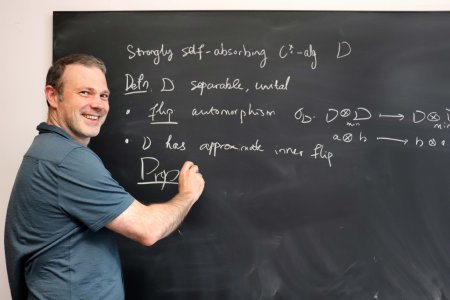The European Research Council today announced the winners of its 2021 Advanced Grants competition and Oxford Mathematician Stuart White was one of four awardees from the University of Oxford for his CSTAR project. Just 14% of applications for grants were successful this year - 253 researchers from across the sciences and humanities received awards out of more than 1,700 proposals. Only nine of those 253 were mathematicians.
Stuart's project focuses on the structure and classification of operator algebras. Classification problems are fundamental in mathematics: how do we decide when two things are the same? Examples include the classification of orientable closed surfaces by their genus (the number of 'holes’). So to decide when two such surfaces are homeomorphic (roughly speaking that one can be deformed into the other), one simply checks if they have the same number of holes. The classification questions at the heart of this proposal are for C*-algebras, which can be viewed as non-commutative versions of topological spaces. These are abstract functional analytic objects, with origins in the mathematical formalism of quantum mechanics. A central theme of Stuart’s research is the transfer of ideas between non-commutative measure theory and topology, using results and techniques from Alain Connes’ classification of von Neumann algebras in the 1970s in the setting of C*-algebras.
Stuart says of his award: "I’m really honoured that this project has been selected for funding by the ERC, showing their commitment to fundamental mathematical research, and I’m really excited about building a world class team of postdoctoral researchers and graduate students in operator algebras in Oxford to deliver the goals of the project."
Stuart White did undergraduate study at Jesus College, Cambridge and a PhD at Edinburgh followed by positions at Glasgow University. In 2019 he came to Oxford where he is Professor of Mathematics and Tutorial Fellow, St John's College. In 2021 he was awarded the Whitehead Prize by the London Mathematical Society and in July 2022 will be an invited speaker at the International Congress of Mathematics.
Funded through the European Union, ERC Advanced Grants are designed to support excellent scientists and scholars in any field at the career stage when they are already established research leaders, with a recognised track record of research achievements. ERC funding is for 5 years for a new research project (though of course built on work started previously). The holding of ERC awards by researchers based at UK institutions is subject to formalisation of the UK’s association to Horizon Europe, which remains the stated priority for the UK government, in line with the Trade and Cooperation Agreement agreed between the UK and the EU in December 2020. In the event that association is not confirmed by the final date for signature of grant agreements then the UK government’s Horizon Europe funding guarantee will apply, with UK awardees receiving equivalent funding via UKRI.
Photo: Evan Nedyalkov


